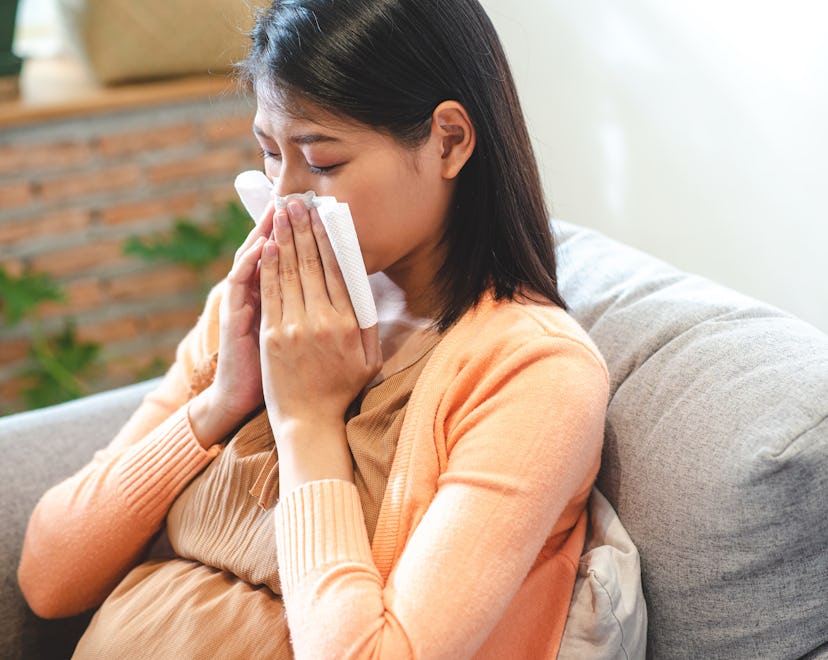Allergies

Is Flonase Safe During Pregnancy? Experts Spill On Allergy Relief
Find out if this nasal spray is a go or a no.
One of the toughest things about being pregnant is trying to make yourself feel better when you’re under the weather. Many of the medications you would normally reach for, even over-the-counter ones that seem harmless, are suddenly off limits when you’re growing a tiny baby inside of you. This is especially true when you have allergies or a cold: it can be hard to find decongestants or similar medications that are pregnancy-safe. That goes for allergy relief medications too. If you want stop sneezing and coughing every time you head outside, you might wonder if using a nasal spray like Flonase is safe during pregnancy.
What is Flonase?
Flonase, formally known as Fluticasone, is a popular over-the-counter nasal spray that treats year-round and seasonal allergy symptoms like sneezing, itching, and a runny nose. It works by decreasing the inflammation in your nose, making it easier for you to breathe. It’s easy to find and it’s affordable, so it seems like a great solution for all of those annoying symptoms. But if you’re pregnant, the first thing you want to do before reaching for any type of medical product it is to find out if it’s okay for both you and Baby. It’s always a good idea to call your OB-GYN and ask them if you’re unsure, but if you’re looking for a response right now, we reached out to experts to find out.
Is it safe to take during pregnancy?
If your allergy symptoms are driving you nuts, you can feel better knowing that it’s likely fine to take Flonase during your pregnancy. “Flonase is category C in pregnancy, which means ‘in animals, studies have shown adverse effects on the fetus and there are no well-controlled studies in humans, but potential benefits may outweigh risks,’” explains Dr. Purvi Parikh, adult and pediatric allergist and immunologist at Allergy & Asthma Network. “Overall, Flonase is considered safe when benefits outweigh risks.”
Other medical experts agree — Dr. Lauren Demosthenes, OB-GYN, says that Flonase can be used during pregnancy, although she notes that it hasn’t been tested thoroughly in pregnancy. “Most health care providers will suggest that it can be used,” she says.
Risks of taking Flonase during pregnancy
According to Dr. Parikh, there are currently no risks to the baby that have been associated with using Flonase while pregnant. “There’s always risks with steroids during pregnancy, but luckily with topical steroids which come in nasal sprays, inhalers, etc. risks are fairly low as very little is absorbed systemically,” she says.
A 2017 study done on the use of intranasal corticosteroid sprays (like Flonase) in pregnancy also found that Flonase is safe to use during pregnancy, with little risk, as long as it’s used at the recommended dosage after a medical evaluation.
While experts seem to agree that there aren’t any known risks of taking Flonase while pregnant, there hasn’t been a lot of research done on it so far. However, there is a more widely studied nasal spray option for pregnant people: “Budesonide/Rhinocort is an equally great option with more safety data in pregnancy,” says Parikh.
Pregnancy-safe allergy remedies
Although Flonase is okay to take while pregnant, you might want to try other allergy remedies as well. Both Dr. Parikh and Dr. Demosthenes recommend the below options:
- Do a sinus rinse with saline. Using something like a Neti Pot or a NeilMed sinus rinse is a good alternative to a nasal spray.
- Run the humidifier at night: This can help if your nose tends to be dry.
- Line the inside of your nose with Vaseline or Aquaphor to help soothe any irritated tissue.
- Wear a mask outside or avoid going outside to limit exposure to known allergens like grass or pollen.
- Take a different OTC medication: Dr. Parikh recommends Zyrtec, Claritin, Benadryl, or Xyzal, all of which are category B antihistamines that can help combat most allergy symptoms.
- Try allergen immunotherapy (AKA allergy shots): This is done “supervised by a board-certified allergist and is also very safe — the only caveat is we usually do not increase the dose during pregnancy,” Dr. Parikh says.
If you’re dealing with frustrating allergy symptoms, Flonase seems to be a safe option to relieve some of them. Talk to your doctor if you have any concerns, but the general medical consensus is there don’t seem to be any risks associated with using Flonase during pregnancy.
Experts:
Dr. Purvi Parikh is an adult and pediatric allergist and immunologist at Allergy & Asthma Network
Dr. Lauren Demosthenes is an OB-GYN and senior medical director of Babyscripts
This article was originally published on